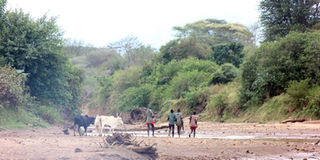Women join peace drive to end Kerio killings

Armed men herd cattle near River Kerio in Kerio Valley on the border of Elgeyo-Marakwet and Baringo counties.
What you need to know:
- The Pokot, Turkana and Marakwet (Potuma) peace initiative will champion peaceful coexistence in war on banditry.
- Potuma chairperson Roselyn Lokorkilim said lawlessness has led to loss of hundreds of lives and property.
- Most members of the group are widows. They lamented that they bear the brunt of attacks.
Women from insecurity-prone areas of Turkana, West Pokot, Baringo and Elgeyo Marakwet counties have vowed to lead the search for peace following a spate of killings.
This emerged after a two-day seminar in Eldoret, Uasin Gishu County. Under the Pokot, Turkana and Marakwet (Potuma) peace initiative, they will champion peaceful coexistence between communities.
Potuma chairperson Roselyn Lokorkilim said the frequent acts of lawlessness in the Kerio Valley have led to loss of hundreds of lives and property. Most members of the group are widows. They lamented that they bear the brunt of attacks.
“We have decided, as women from the affected communities, to come together and look for a lasting solution to the problem. We are a suffering lot. Enough is enough,” said Ms Lokorkilim.
They plan to rely on their knowledge, experience, skills and social networks to prevent conflict and build peace.
Ms Doreen Lomeri, a Turkana woman from Kapedo married among the Pokot in Chemolingot, narrated her ordeal due to banditry.
“I am deeply hurting for our young men. Our children from Pokot and Turkana are killing each other. Every day we wake up to different deaths, either of a family member or a neighbour. We are pleading with our children to stop fighting and embrace peace and unity,” she said.
Shared facilities
They want the government to build schools at the border of Pokot and Turkana, as a way of fostering peace.
“We need cohesion in the Kerio Valley and education will help the young children learn how to co-exist and this will bring communities together,” Ms Lomeri said.
Ms Rohina Pyatich, a Pokot married in Marakwet, said she has not seen her Pokot family in a long time as she cannot dare travel through the dangerous valley.
“The markets have been closed down. If my loved one is sick or even dying of hunger, there is no way I can be offered any help. I am stuck here in Marakwet. I cannot travel for fear of not knowing what awaits me on the road,” Ms Pyatich said.
She said the region is now home to over 300 widows and thousands of orphans. “Women have not only been widowed but are also victims as they are also killed or maimed by bandits,” she said.
The workshop brought together development partners, churches and NGOs in the fight against cattle rustling. It was graced by Australian High Commission Head of Mission Luke Williams, who said he was impressed by efforts to restore law and order in the Kerio Valley.
“The Australian government will support efforts in the search for peace along the valley. Security matters are collective responsibility where everybody must participate if we are to get rid of few criminals in society,” he said.
Mr Williams said it was encouraging that women have resolved to take the lead in the search for peace.
“When I was approached, I could not hesitate to assist in this fantastic programme. It’s women who are key to solving issues around conflicts in the Kerio Valley. We will assist with what we have to ensure the success of this initiative for the sake of peace and stability,” he said.
Generations at stake
Also present was Gender CAS Linah Kilimo, who expressed concern that the population could be wiped out if the attacks continued. She said women are afraid that there will be no future generations as men are murdered every day.
“As mothers, we will go up to where the warriors, the majority of whom are youths, are holed up and implore them to stop the killings. It is unfortunate that relatives are killing each other considering that the Pokot intermarry with the Marakwet, the Marakwet intermarry with the Turkana and the Turkana intermarry with the Pokot,” said the CAS.
“As women, today we are saying it’s enough; we might miss a whole generation and may be wiped out because of lack of peace in the region.”
Mrs Kilimo noted that women are integral stakeholders in conflict prevention and resolution.
“We have decided to use women in the search for peace along the Kerio Valley because they are always the most affected during conflicts,” she said, calling for local solutions.
“It has become clear that policies and programmes aimed at preventing armed conflict, building sustainable peace, and post-conflict reconstruction would not succeed without women's active participation.
“Women have prevented conflicts by negotiating with warring parties to embrace peace because it’s them and children who suffer most during conflicts.”


